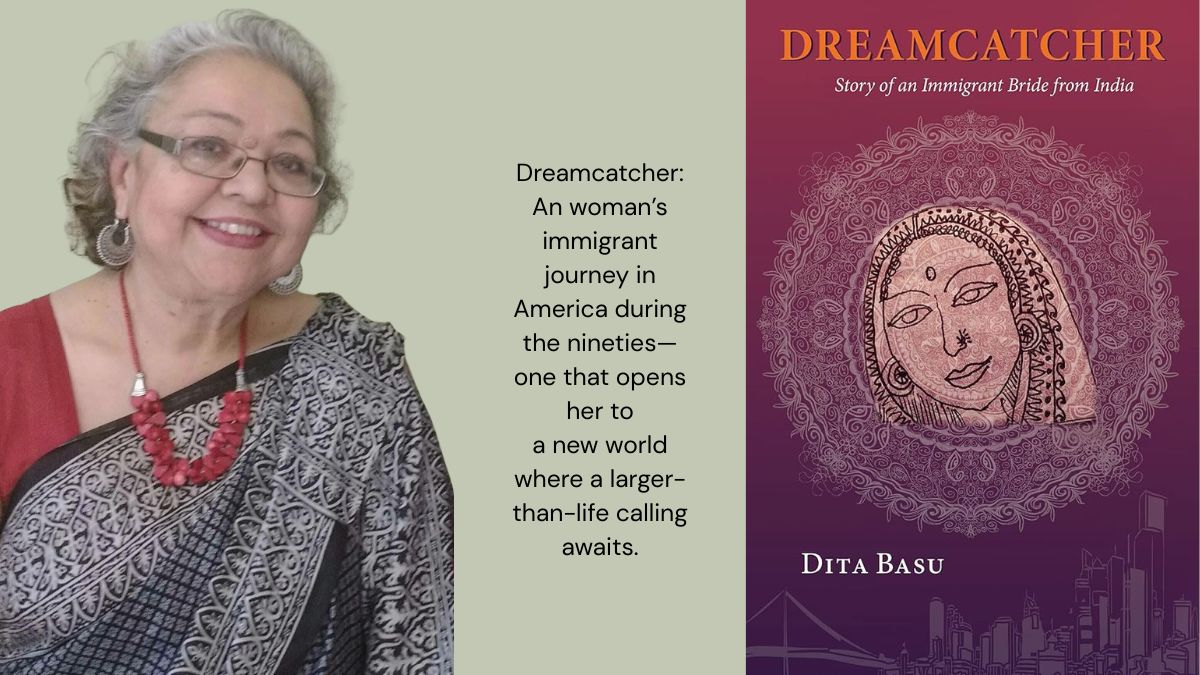Estimated reading time: 5 minutes
A bicultural perspective
Anindita Basu, also known as Dita Basu, is a prolific writer who calls Walnut Creek, California, her home, having lived and raised her family in this quaint Bay Area suburb for over four decades. Originally from India, Dita brings a unique bicultural perspective to her work, writing in both her mother tongue, Bengali, and in English.
Retired from a teaching career, Dita now dedicates herself fully to her passion for writing and storytelling. When the muse takes a break, Dita enjoys the creative outlet of beading or exploring faraway places with her husband.
Dreamcatcher
Her novel, Dreamcatcher: Story of an Immigrant Bride from India, is a compelling work of women’s fiction that delves into the emotional landscape of an immigrant bride arriving in the Bay Area during the nineties. It chronicles one woman’s immigrant journey through 1990s America, a path full of struggles but one that ultimately leads to a profound personal awakening. Dita also authored the Young Adult historical novel, Shadow Birds: Story of a Young Girl during the Partition of India, published in 2019.
Shila’s familiar life in India shatters when her husband, Asim, announces his impending move to America along with Shila and their daughter, Jaya. Shila follows him to the distant, foreign land, clinging to her father’s hopeful pronouncement: “This man has ambition. He’ll rise to the top.”
Yet, Asim’s relentless pursuit of his own career goals leaves Shila navigating a new culture and raising their daughter with little support from Asim. He’s often away, absorbed in his world, while she grapples with the solitude of an immigrant existence.
An impending return to India
The tension culminates years later when Asim decides to return to India. With their daughter soon leaving for college across the country, Shila faces an empty nest and a stark ultimatum: abandon her American life and return with Asim, or remain alone in a country that has become her home, and risk her twenty-year marriage. The desires of her heart pull her in one direction, while the security of her past beckons in another.
Informal and intimate narrative
Dreamcatcher’s language is informal and intimate. The author weaves an engaging story around Shila, the protagonist of the narrative, and her journey from a suburban atmosphere in Bengal to America. Shila came here as a new bride with her husband through an arranged marriage. But the story is more than the clichéd struggles of a new bride trying to adjust to the new culture and vastly different values in a faraway land. Basu describes the journey and development of a woman who is trying to find herself and her life’s calling. Of course, there is no dearth of travails and tribulations along the way, including bringing up her daughter, Jaya, single-handedly.
A detailed and descriptive style
I commend the author for her detailed and descriptive narrative style. Some of the descriptions that impressed me included the scenery of Big Sur and the Pacific Ocean. I was also taken in by the descriptions of the buildings of St. Mary’s College and how it built up a yearning within Shila for being a student there (which ultimately materialized), her vivid portrayals of her experiences during the earthquakes descriptions of the clouds in the sky – in their varied shades – all of these added considerably to the mood of the book. But perhaps the most interesting were her descriptions of facial expressions – a smirk on the face, puckered lips, and stitched eyebrows (this was a new one for me!).
Reading through the book, I, however, could not help feeling that the author may have been a little too negative about society in the US and, to some extent, society at large. Many of the women were single parents or victims of spousal abuse, beginning with Esmeralda in New York, to Miss Dmitra, and later Saheli and Kabita. Shila’s treatment from Asim, her husband, was, to me, quite outside the norm. The only ‘complete’ couple is the elderly couple in the neighborhood who died in an earthquake.
A few other items struck me as somewhat unusual. I was surprised that Jaya, her daughter, did not have any memory of the Durga Puja, the biggest Bengali festival, when she first heard about it. After all, when she came to this country, she would be at least four or five, and had grown up in a typical Bengali atmosphere before that. I was also somewhat surprised that there is no mention anywhere of Shila’s association with any local Bengali family or society. The book mentions that Shila and Jaya did attend a Durga Puja celebration in the Bay Area.
But all’s well that ends well. By the end of the book, Shila is firmly established in her life’s calling to help battered women, while Jaya is well established in Columbia and getting ready for bigger and better things. Even Kusum, the family’s domestic help’s daughter in India, who was in dire straits earlier, has her troubles behind her, and her future looks promising.
Finally, I noticed a few ‘blemishes.’ In one place, the text says ‘pony tale’ instead of ‘ponytail’. Horses ‘neigh,’ not ‘bray;’ Donkeys ‘bray’. Several times in the book, it says ‘chimed’ when perhaps it should be ‘chimed in’. But this is a rather small number for a 380-page book. Overall, a positive story and an engaging read.
Related

